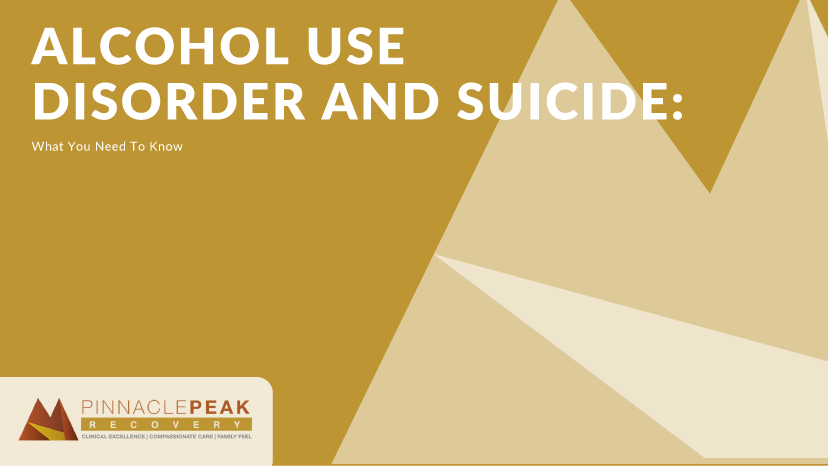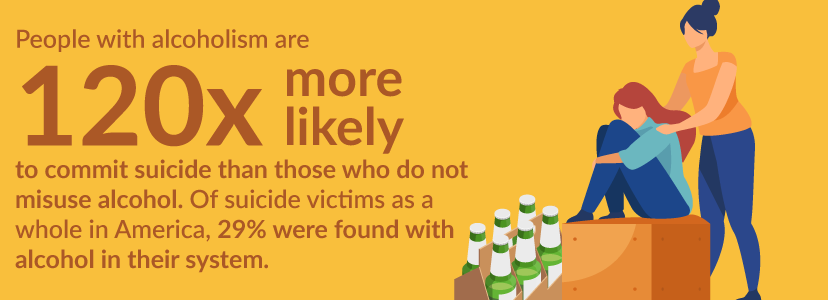Alcohol Use Disorder and Suicide

Alcohol Use Disorder and Suicide: What You Need To Know
Disclaimer: Suicide can be a triggering topic. Please read with caution. If you or someone you know is at risk for harming themselves, call the National Suicide Prevention Hotline at 1-800-273-8255.
Are you worried about your depressed son, a college student with a habit of drinking excessively?
Maybe it’s your best friend who has struggled with depression her whole life and has been going out every night, calling you moments before she blacks out.
Or even your husband who takes a case of beer and locks himself in the basement every night where the open gun safe is stored — and you know he’s developed depression since the loss of his parents.
Unfortunately, many people have a loved one that has committed suicide. And although there isn’t a single reason for what drives suicide, one thing is clear: Alcohol use has been found as the cause of nearly one-third of suicides.
That equals around 7,500 people each year on a national level.
Pause, and let that sink in for a minute. In 2020, 1,438 Arizonans died from suicide. On average, one person in the state died by suicide every six hours. For alcohol-related deaths, Arizona ranked 10th out of all 50 states. That equals four people per every 100,000.
They were mothers, aunts, uncles, brothers, fathers, grandparents, friends, neighbors, classmates, and coworkers.
They were teachers, Amazon drivers, engineers, restaurant servers, immigrants, honorably discharged veterans, daycare workers, business owners, and artists.
How Did We Get Here?
Alcohol has become a form of self-medication. This can be due to underlying mental health issues such as depression or bipolar disorder, a relationship that went off the deep end, or struggles at a job. The alcohol starts off as a quick fix to the problem, moves on to a tolerance, and eventually ends up as an addiction. When someone has a history of these experiences in their life, it can lead to alcohol use disorder.
Mixing the misuse of alcohol with one or more of these conditions can cause someone to make choices that they wouldn’t necessarily make when they’re sober. This is because alcohol affects the brain’s decision-making capabilities. It can move them to take their own life when the alcohol convinces the person that they’re better off dead instead of suffering while sober.
Poor decision-making while under the influence of alcohol is all too common. It could be the mean text message you sent to your ex-best friend, calling your ex as you’re in an emotional puddle of tears, or getting charged for public intoxication when your anger gets out of control at the local pub. Nonetheless, there are a lot of situations with alcohol where poor decisions take the lead, but nowhere hits as painful, impactful, and irrevocable as choosing suicide.
Dr. Conor Farren, addiction psychiatrist, consultant, and researcher at St. Patrick’s Hospital in Ireland frequently gives clinical senior lectures at Trinity College Dublin on his research findings, and has written many scientific articles related to addiction and mental health. He discussed some of his findings during a lecture in 2013.
What’s the Connection Between Alcohol Use Disorder and Suicide?
George Murphy, MD and Richard Wetzel, PhD noted in a psychiatry study published in the International Journal of Environmental Research and Public Health that people with alcoholism are 120 times more likely to commit suicide than those who do not misuse alcohol. Of suicide victims as a whole in America, 29% were found with alcohol in their system.

Excessive alcohol use, whether that is binge-drinking or alcohol misuse, puts the brain in a state where decision-making is impaired.
Binge-drinking is defined in the medical profession by five or more drinks for men and four or more drinks for women over a period of two hours. As for alcohol use disorder, this would be 15 or more drinks for males and 12 or more drinks for females per week.
For example, let’s say the person who struggles from depression from his recent relationship fallout turns to alcohol as a way to self-medicate. It doesn’t take long for him to realize that alcohol helps him escape having to live in a sober world with the pain that he feels.
So, he takes up drinking more both in amount and frequency. He gets so deep into this state of mind that his previously existing mental health issues mixed with alcohol make him feel he would be better off ending his life. One night when he has drunk too much, he commits suicide. Sadly, he is someone who has fallen victim to alcohol use disorder and suicide.
The Rundown on Alcohol Use Disorder
Alcohol use disorder occurs when someone drinks so much that their body becomes dependent on alcohol. It can further lead to issues in one’s life including physical health problems, mental health problems, loss of a job, legal and financial complications, loss of relationships, or even death.
Oftentimes, people have different symptoms, but a common one is wanting to cut back on how much alcohol is consumed, but being unsuccessful. It is also quite common to fail in fulfilling obligations at work, school, or home, thus causing further physical, social, or interpersonal problems.
According to the Mayo Clinic, some signs can include
- Being unable to limit the amount of alcohol you drink
- Spending a lot of time drinking, getting alcohol, or recovering from alcohol use
- Feeling a strong craving or urge to drink alcohol
- Giving up or reducing social and work activities and hobbies
- Using alcohol in situations where it's not safe, such as when driving or swimming
- Developing a tolerance to alcohol so you need more to feel its effect, or you have a reduced effect from the same amount
- Experiencing withdrawal symptoms — such as nausea, sweating, and shaking — when you don't drink, or drinking to avoid these symptoms

